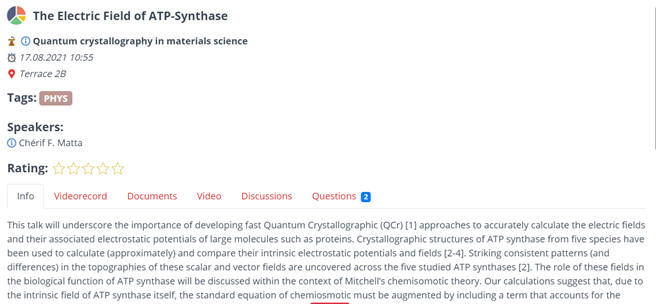
The IUCr organizes its congresses connected with assemblies
once in three years. In the meantime there are conferences of its regional
associates - ACA, AsCA, LACA, ECA. In the Czech Republic the ahering body is
Regional Committee of Czech and Slovak Crystallographers included now in
Crystallographic association (Krystalografická společnost) registered in the
Czech Republic - international name Czech and Slovak Crystallographic
Association (CSCA). Since modern crystallography is very intersdisciplinary
and no single institution (university, institute) can cover its whole scope it
was just CSCA which took the effort to organize the congress in Prague and after
several attempts we won the bid in 2014 during the congress in Montreal. This
was a bid for the the organization of the 25th anniversary congress in 2020.
After all the congress was realized basically as planned in
last monts as hybrid and in very nice atmosphere also for online participants as
it follows form e-mails received after the congress. Very good quality programme
could be prepared. In this aspect the possibility of online presentation is very
positive because for invited speakers this can be quite simple and much cheaper.
Only a few approached speakers refused. We have over 2500 pre-registered people
and total number of final registrations reached nearly 1700. Less than one third
was able to come to Prague, quite often for shorter time, they watched the rest
online. With respect to restrictions we had most real participants from Poland
and Germany but other arrived from France, Spain, Swedenm Denmark, Finland,
Croatia, Italy, USA and other countries.
Programme consisted of three plenary lectures, five lectures connected with prizes, 35 keynote lectures, 103 standard sessions, 7 special sessions, Software Fayre – always 9 sesssions in parallel, 55 poster sessions and several commercial presentations. In total 624 lectures and over 550 posters in different forms were presented at the congress.
In this year, two sessions devoted to structural biology of coronaviruses and to new methods to fight with pandemic. In biocrystallography the highest number of abstracts arrived to the session on structural biology of enzymes and also to bioinformatics. New W.H and W. Bragg prize lectures were also related to biocrystallography – Structure-guided design of nex-generation malaria vaccine (Jean-Philippe Julien, Kanada), Targeting COVID-19 Viral Enzymes in an Evolving Landscape of Publishing and Peer Review (James Fraser, USA) - as well as one plenary lecture by David Eisenberg The Expanding Amyloid Family: Structure, Stability, Function, and Pathogenesis related for example to Alzheimer desease. The main Ewald prize and one plenary lecture were related to crystallographic data and databasis. The Ewald prize was awarded to Olga Kennard (UK) for the development of Cambridge structure database and plenary lecture by Helen Berman (USA) was devoted to protein database PDB. Several sessions and pre-congress school were devoted to electron crystallography (structural studies by electron diffraction). The school was mostly online but last day in hybrid form. There were nearly 200 registered participants. In this branch, the Gjonnes medals are awarded. The prize went to Sven Hovmöller (Sweden) and Ute Kolb (Germany). Another significant topics of the congress was quantum crystallography. For both above topics relatively many experts were able to come to Prague. Among materials, the highest attention attracted materials for energy conversion and storage often studied in-situ (also plenary lecture by Clare Grey - In situ and ex situ studies of battery materials with magnetic resonance and diffraction methods) nanomaterials, magnetic materials. The highesty number of abstracts were in the session - Complex structure of minerals and inorganic compounds and also in the session of phase transitions in complex materials. A high interest was also for the session of disordered materials. In spite of low advertisement of the congress among chemical crystallographers the highest number of registered people was just from this area – materials important for pharmaceutical industry, metal-organic frameworks (MOF), catalysis. Two sessions were dedicated to application of crystallography in art and many sessions to individual techniques as neutron scattering, small-angle scatering, synchrotron radiation, XAFS etc..
All presentations were run from local servers in Prague (details see also https://www.tri.cz ) and speakers were asked to upload their presentations (pptx, pdf) in advance, that was not accepted by all which caused stressful situations to technical staff, in particular at the beginning of the congress. Files undergone technical control before they were approved for smooth presentations. If the speakers were online then they had full control of presentation by arrows and mouse motion was mapped and shown (pointer). Remote participants could write questions into tab „Questions“. These questions were visible by all and co-chairs could select them for live discussion. The questions could be answered later by speakers in „Discussion“. As a new feature, possibility of live entrance by remore participants was included by request "Raise hand". Entrance was allowed by co-chairs and for remote participants a quick test of their microphone and camera was included before they were connected.
A few speakers decided to upload full lecture as an mp4 video. Especially in case of inconvenient time differences (as west coast of the USA, or Australia). Quite often they were availabel live for discussion. The presentation files are not accessible by anybidy but each author could upload files without format restrictions to tab „Documents“ and these files are available for download for registered participants. During congress we met all possible combinations of locations of speakers, two co-chairs and asking participants and always everything worked well.

gCon page of one lecture – Info: abstract, Videorecord – recording of the lecture, Documents – documents for download, Video – video provided by the author for download, Discussions – active all the time, Questions – active only during the lecture and immediate discusssion but visible all the time.
All the poster files are available for vieweing and download (unlike recordings). It was possible to upload not only images of posters, pdf but also pptx presentations or mp4 videos according to needs of the authors. In time of poster sessions for each poster virtual room could be entered. The limit of one room was 25 visitors and the rooms were working for live meeting similarly to e.g Zoom with possibility of screen sharing. Of course, in hybrid mode it was necessary to separate virtual rooms from real poster sessions. In addition to usual poster panels electronic panels were avialable too allowing easy search and zooming of details.
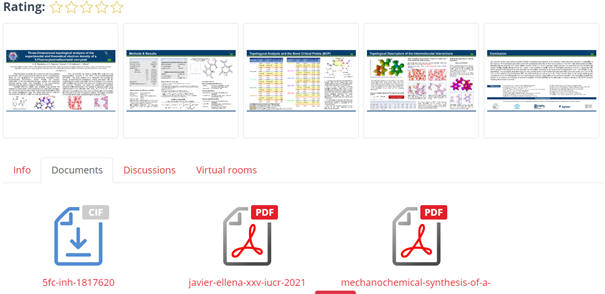
gConpage of a poster – the author uploaded more pages and in addition some documents. Virtual room was active only during corresponing virtual session
All the congress materials – recordings of all lectures, posters and other recordings (meetings, concerts) are available for viewing for registered participants till the end of November, 2021 (www.iucr25.org, iucr.gcon.me).
All responses of local and remote participants show that the congress was successful in most of aspects and it was better than expected when a number od people were sceptical to the hybrid form. Perhaps, it can be taken as an example for hybrid congresses. The credits should be given to all people involved in the organization. For the good impression of online participants probably the greatest credit goes to T.R.I., their system gCon and very professional approach. Namely, the way of streaming and design with views of lecturers, chair persons, asking people, hall that made the congress really live. Online participants appreciated also streamed concerts. They were simply attracted directly in the action of the congress. Below, there are screens captured from recordings.
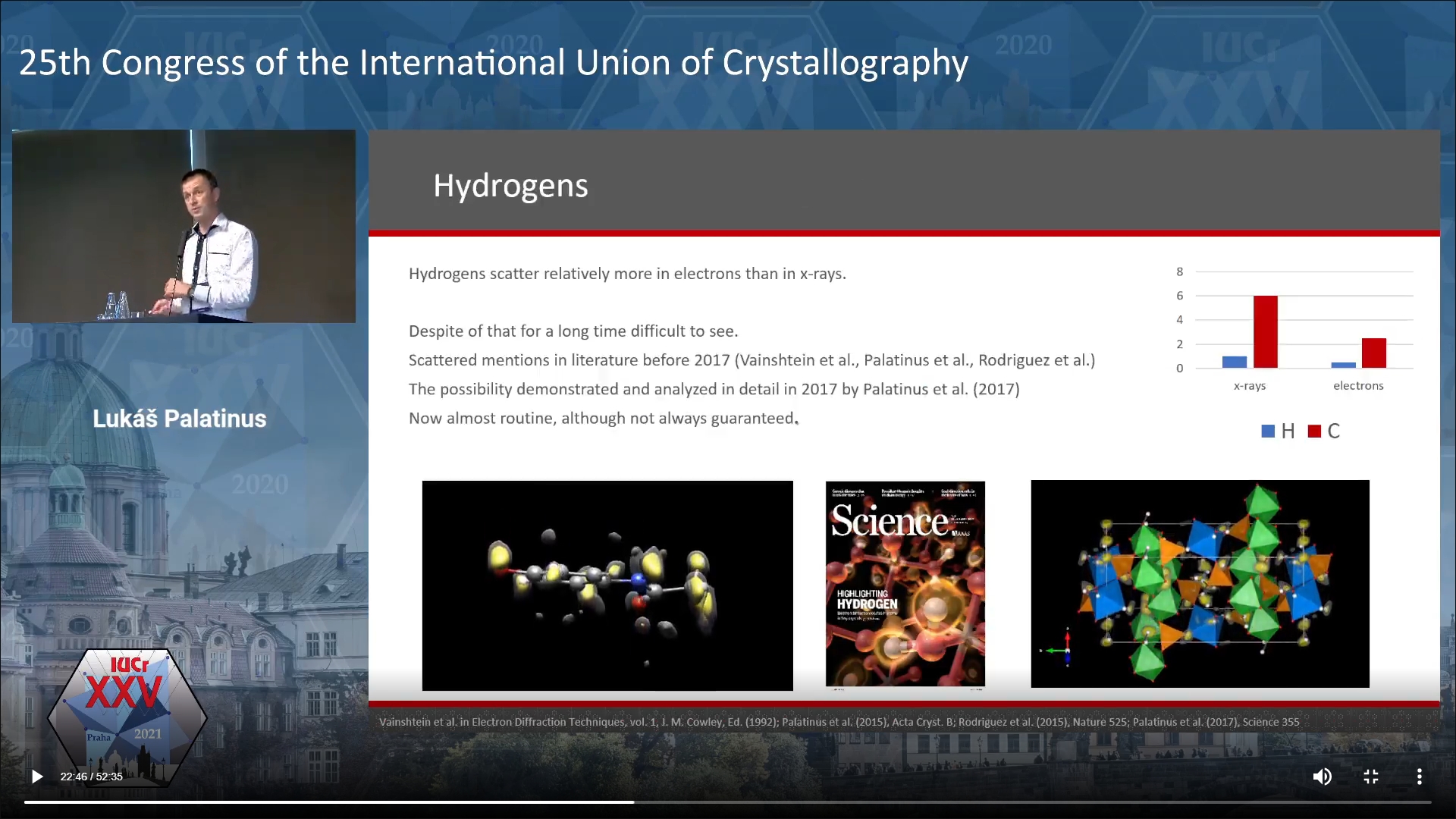
Typical screen of live lecture in the stream
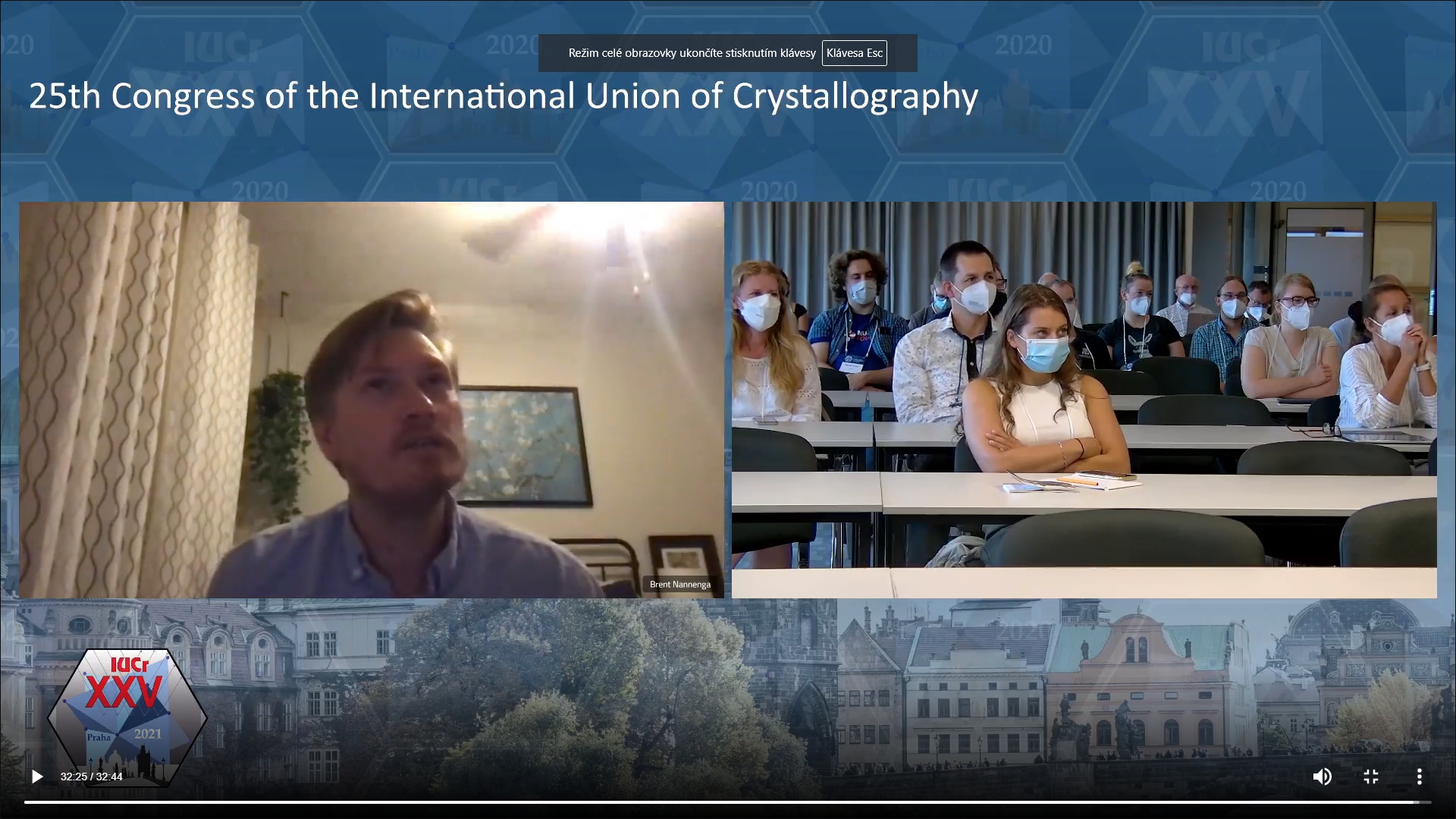
Remote speaker, local listeners
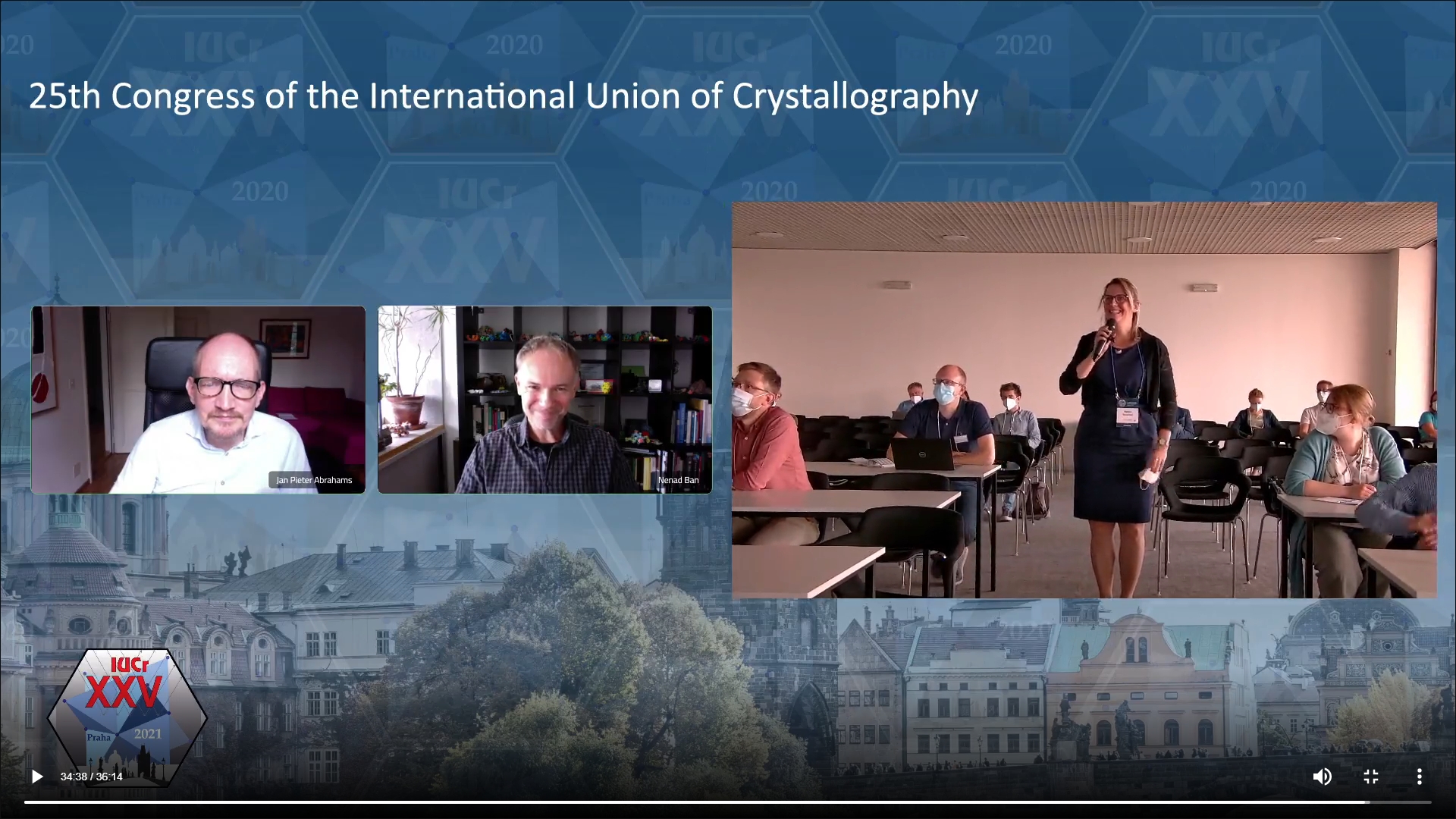
Remote chair, speaker, local listeners
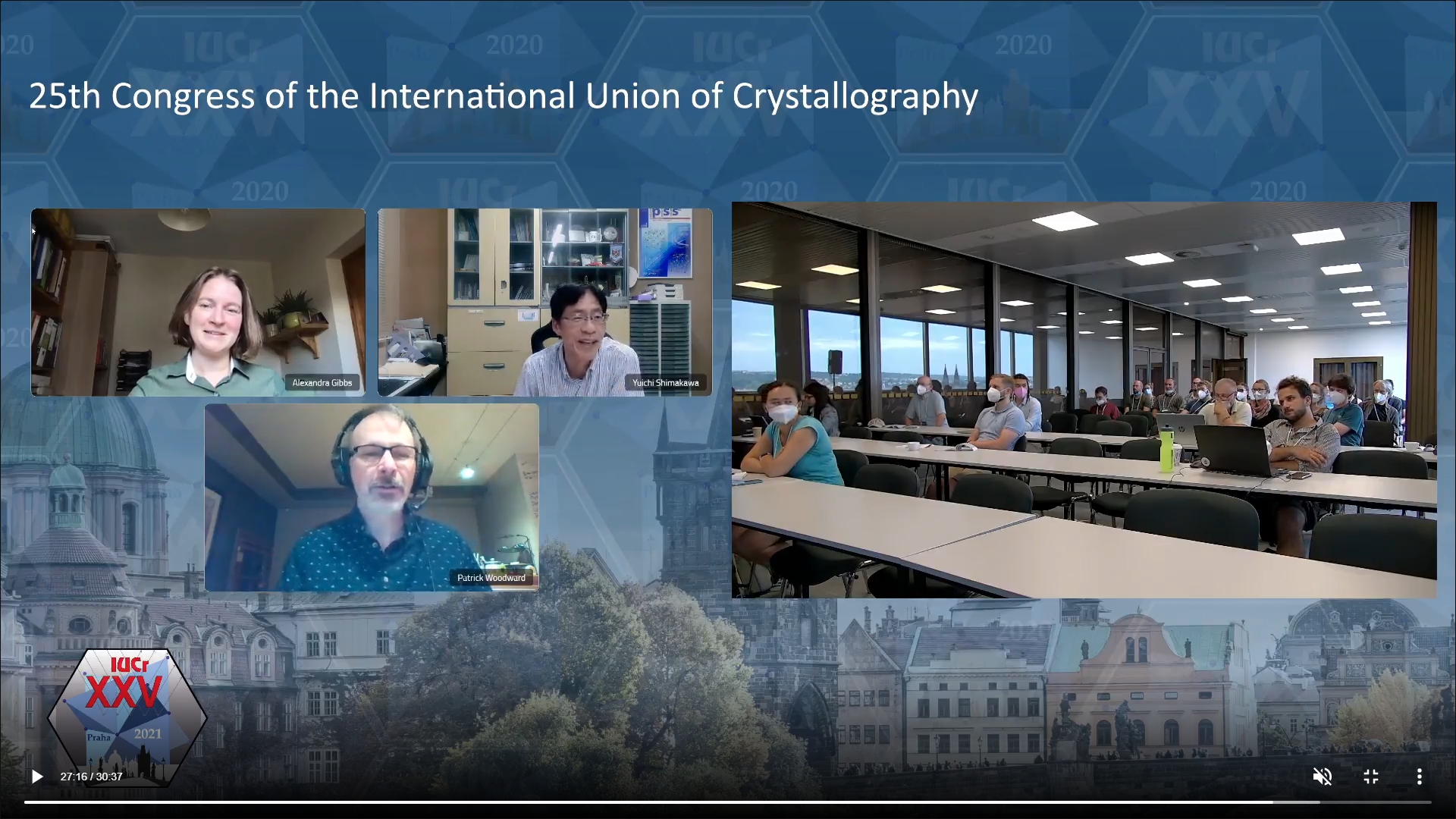
Remote chair persons, speaker, local listeners.
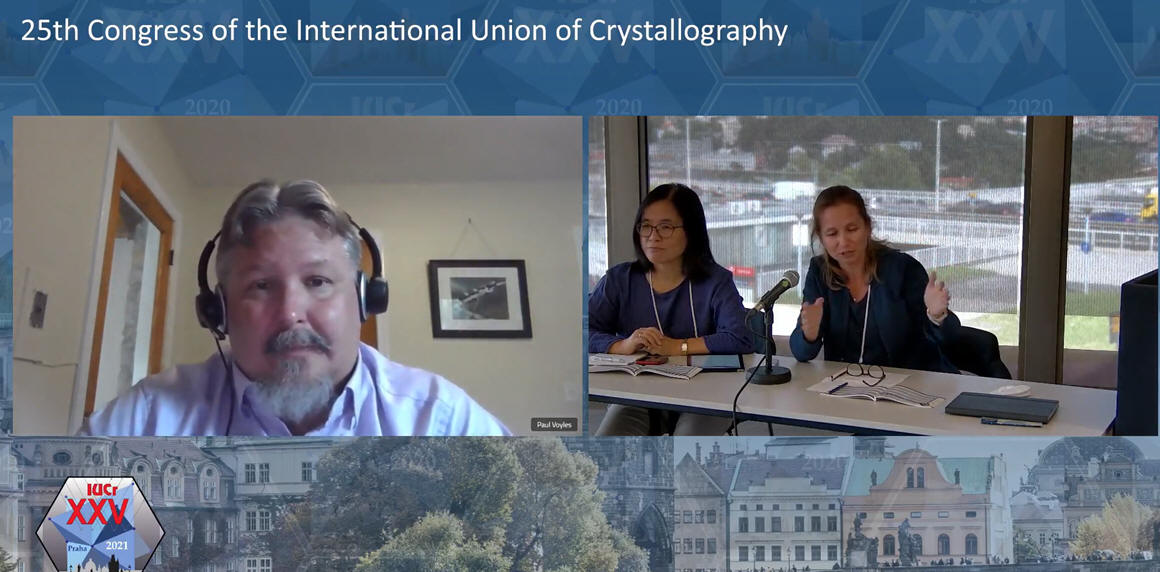
Remote speaker, two local co-chairs
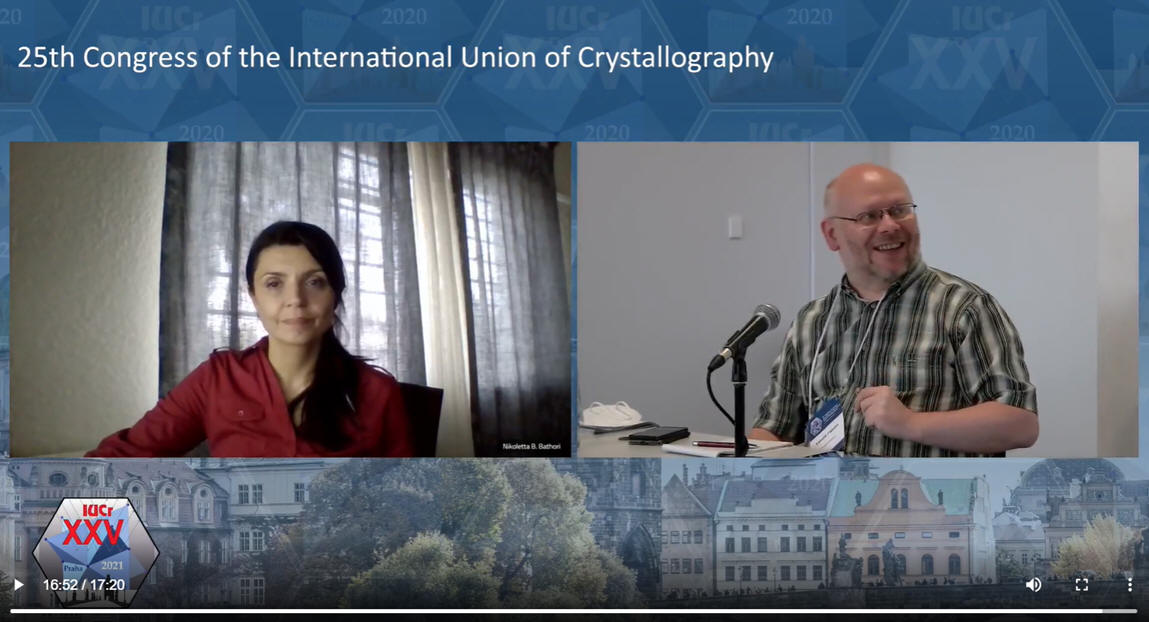
Remote co-chair, local co-chair. Speaker was on-site
Relatively long absence of real events was reflected in positive acceptance by onsite participants, work of the staff of Prague Congress Center and catering company Zátiší. All were doing their best for the success of the conference. Of course, organizers should be mentioned first: colleagues from the Faculty of Mathematics and Physics - Milan Dopita and other colleagues and students, people from Institute of Organic Chemistry and Biochemistry CAS (Pavlína Řezáčová, chair of local organizing committe), Faculty of Science, University of South Bohemia in České Budějovice (Ivana Kutá Smatanová, chair of itnernational programme committee), from the Institute of Biotechnology (CAS) and very important group Auletris (headed by Martin Haloun) www.auletris.com . We were very satisfied with the Conftool registration system ( https://www.conftool.net ) and also presentation system gCon by T.R.I.
In addition to scientific programme, socila programme was organized – boat trips on Vltava river, conference dinner with a Brand New Band concert in National House and train trip to Pilsen brewery. For more see https://www.iucr25.org .
Different conference statistics are available at https://iucr25.org/hybrid-conference-statistics/
Photos and short video clips https://www.xray.cz/iucr/photo/default.htm
Radek Kužel, IUCr25 chair
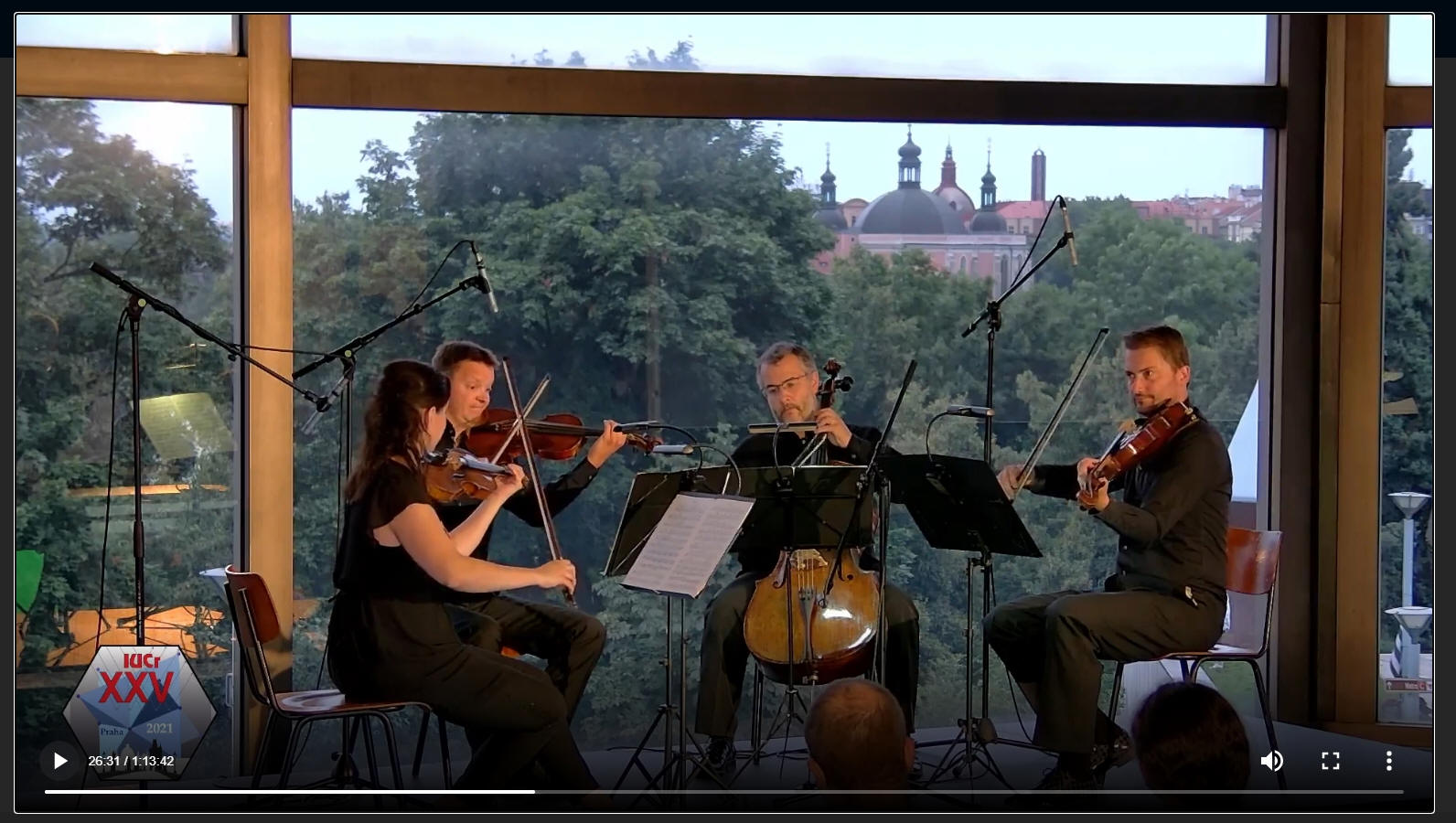
From the concert
from E-mails
Dear Radek Well now! The organization of the Congress was fantastic and everything including the remote presentations and interactions were perfect. I congratulate you and your team in achieving the seemingly impossible. This Congress will surely go down in everyone’s memory as a very special success. I am lost in admiration for what you have been able to do. Kind regards Mike
Dear Radek, Pavlina, Ivana, and all Czech Friends, What you have done with the 2020/21 IUCr Congress organization is beyond description. I am writing to express my highest appreciation and congratulations to you and your teams: you have overcome the impossible and organized an amazingly successful IUCr Congress. The organization was flawless but also the scientific content was magnificent. From my point of view (a very active on-line participant) everything worked perfectly; and the quality of the virtual environment was breathtaking. A quantum leap in the mastery of IUCr congress organization. With my all best wishes, Mariusz
Dear Radek, Please allow me to hearty congratulate you and also your team for the organization of the wonderful IUCr Congress. You did an excellent job and organized a great conference. As an on-line attendee I could fully enjoy the meeting. It is a huge advantage that the lectures will be available on-line for three more months. As you said in your closing remark, it is the start of a new era. I believe that the in person meetings are very important but from now on hybrid conferences and archiving the conference events are recognized and will be followed. I both liked the lecturer and the chair functions of the gcon platform. The poster session was the best I have ever experienced. All best wishes, Petra
Dear Radek, the congress is almost at the end. Since I will not be able to do this in person, let me send you my biggest and warmest congratulations for what you have achieved, it has been a splendid congress with an excellent program and a perfect organization. You and your colleagues have been fantastic. Thank you so much for allowing us to gather in this novel mode, but with really common and joint spirits. Alessia
Dear Radek and Ivana, I had to leave the Congress early to join my family for a vacation. I just wanted to let you know that I think you have done a fantastic job organizing the Congress, especially under these difficult circumstances. Everything was great at all levels of organization, and I think the scientific quality of the meeting was very high. I have heard similar opinions from many other people. I think the Congress was definitely a success. Thank you for all you work! With best wishes, Marcin
Dear Radek, Ivana, Pavlina, and Martin, Congratulations on successfully hosting such a wonderful congress. None could have managed the COVID situation better than you did. The content was top quality, and the opportunities to connect with colleagues were many. I spent the whole morning today working through continuing research-related email conversations started during the congress. I’ll still look forward to watching recordings of some presentations that I missed. Your hybrid meeting platform will be a benchmark for future congresses. Thank you for so many years of effort to strengthen the union and to make Prague 2020 a great experience. I wish you a speedy recovery from the long weeks of fatigue! Branton
Dear Radek, I would like to thank you and all the organizers for an unforgettable congress. Every IUCr congress stays in my mind as an inspiring and engaging experience from a scientific point of view. This time I would say that, looking at you and at your team, I learned from your example how it is possible to face unpredictable events and challenge them by exploring new paths without losing your smile and kindness. As a chair of a session I would like to acknowledge your support in all the phases of the difficult task of assembling the program and the support of the technical team during the session.. This IUCr congress was a remarkable event for me as a scientist and more important as a human being. I enjoyed every moment! Grazie di cuore. Consiglia
Dear Radek, It was an amazing Congress and the job you and your teams (all of them) did is unprecedented! We all enjoyed Prague Congress even we were not there. You proved that it is possible to "do" a big, hybrid meeting, many others before you tried and failed. You, "The Prague" showed a new way. Frankly I prefer old way - but this IS the way of the future. Hanna
Prague Convention Bureau awarded the IUCr-25 congress as a hybrid congress of 2020 and 2021.